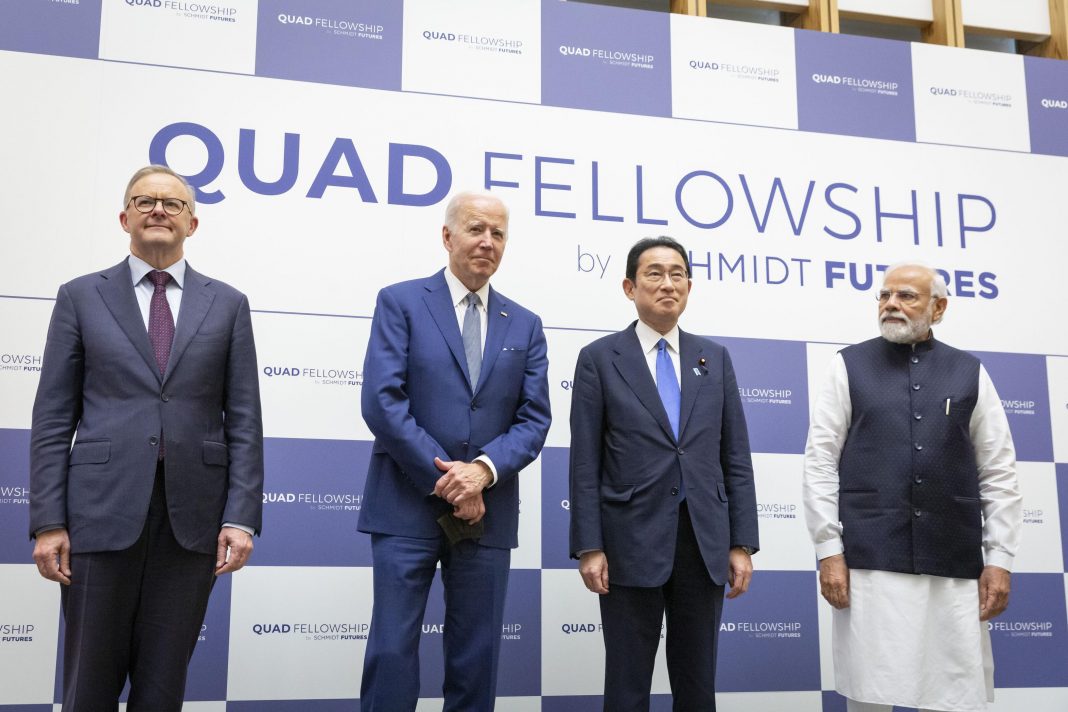Asia Biden’s Indo-Pacific Pact: What Does ‘Friend-Shoring’ Mean For Asia Vasuki Shastry Contributor Opinions expressed by Forbes Contributors are their own. I write about Asian economics and technology news. May 24, 2022, 06:40am EDT | Share to Facebook Share to Twitter Share to Linkedin (L to R) Australian Prime Minister Anthony Albanese, U.
S. President Joe Biden, Japanese Prime . .
. [+] Minister Fumio Kishida and Indian Prime Minister Narendra Modi attend the Japan-U. S.
-Australia-India Fellowship Founding Celebration event on May 24, 2022 in Tokyo, Japan. Yuichi Yamazaki/Pool/Anadolu Agency via Getty Images President Biden was in Korea and Japan this week for a meeting with Quad leaders and the launch of the ambitious Indo-Pacific Economic Framework (IPEF), which China’s Foreign Minister testily described as being “doomed to failure. ” On the face of it, the IPEF’s ambitions appear to be constrained by design and intent.
It is not a full-blown Asia-centered free trade agreement like the Comprehensive and Progressive Agreement for Trans-Pacific Partnership (CPTPP), the regional free trade agreement which America originated and walked away from in 2017. Or the Regional Comprehensive Economic Partnership (RCEP), which includes China and a lineup of nations similar to the CPTPP. In this context, does the IPEF fall short in the Biden administration’s declaration that it is back in Asia and ready to engage with allies to counter China’s formidable rise? The White House announcement frames the IPEF in suitably ambitious terms, with huge benefits for “families, businesses, and workers in the United States and the Indo-Pacific region.
” The emphasis on domestic benefits is an important political consideration, meant to counter American right and left skepticism about the merits of free trade. The initial list of Asian countries signing up to the IPEF—it includes Japan, Korea, India, Australia, New Zealand, and seven of the top members of Asia—is truly impressive and the grouping accounts for around 40% of global economic output. The crucial difference is that unlike conventional FTAs, where preferential market access and concessional tariffs are huge attractions, the IPEF offers neither and focuses instead on addressing deficiencies in the current governance of the global trading system.
Quite simply, America via IPEF is attempting to ensure that it will continue to shape and influence the rules of engagement in areas like cross-border data flows, the ethical use of AI, resilient supply chains, and clean energy. Global governance is splintering in many of these emerging sectors, with China and America attempting to articulate their own global rules of the road. The establishment of IPEF is a geopolitical chess move meant to checkmate China’s ambitions.
However, there are questions on enforceability and America’s ability to ensure that IPEF members fall in line on implementation of the framework’s objectives. This is where the Biden administration’s articulation of “friend-shoring” comes into play. In a speech in Washington D.
C. on April 13, Treasury Secretary Janet Yellen said that America’s objective should be to “achieve free but secure trade” and described “friend-shoring” of supply chains “to a large number of trusted countries” as a way to “securely extend market access. ” While “friend-shoring” does not feature in the IPEF announcement, it is all but clear that it is the implicit feature of the framework.
It is an ambitious attempt to reconfigure global supply chains away from China and to build open digital standards. The eleven other signatories to the IPEF will soon realize that options for sitting on the fence of the U. S.
-China geopolitical tussle have narrowed. The risk of “geoeconomic fragmentation,” which the IMF warned about this week, have increased substantially. Vasuki Shastry Editorial Standards Print Reprints & Permissions.
From: forbes
URL: https://www.forbes.com/sites/vasukishastry/2022/05/24/bidens-indo-pacific-pact-what-does-friend-shoring-mean-for-asia/



